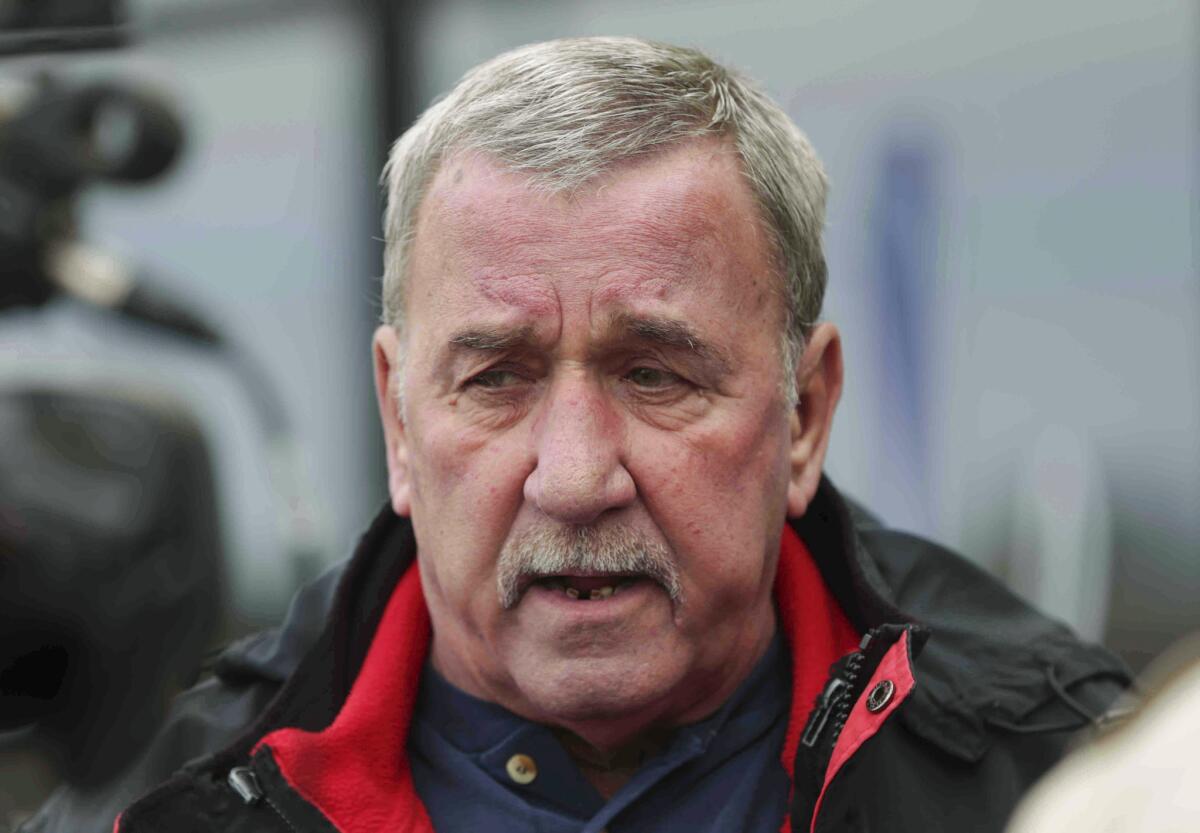Op-Ed: The story behind Trump’s tweet attack on Chuck Jones of the United Steelworkers

- Share via
When President-elect Donald Trump tweeted out attacks Wednesday night against an Indianapolis steelworkers official, he wasn’t just letting off steam; he was seeking to stifle dissent and weaken a powerful labor union.
The official, Chuck Jones, apparently offended Trump by saying he had “lied his ass off” when he claimed to have saved 1,100 jobs at Carrier’s plant in Indianapolis. In truth, Trump helped to save 800, not 1,100.
So at 7:41 p.m. Eastern time on Wednesday, Trump tweeted, “Chuck Jones, who is President of United Steelworkers 1999, has done a terrible job representing workers. No wonder companies flee country!” And at 8:56, Trump tweeted, “If United Steelworkers 1999 was any good, they would have kept those jobs in Indiana. Spend more time working-less time talking. Reduce dues.”
Jones told the news media that within hours of Trump’s Twitter attack, he had received menacing phone calls, including one saying, “We know what car you drive.’ ”
One can imagine that, with such a precedent, many business leaders, union officials and others might grow reluctant to speak out against Trump.
Even before Jones’ truth-telling, Trump had reason to dislike the man because his union, the United Steelworkers, had endorsed Hillary Clinton.
Setting aside purely personal issues, Trump’s attacks on Jones and the Steelworkers were based on several misapprehensions. When I interviewed Jones several months ago, he told me that he and his union had worked hard to persuade Carrier and its parent company, United Technologies, not to move the roughly 2,100 jobs they had announced would be heading to Mexico —1,400 from the Carrier plant in Indianapolis and 700 from a plant in Huntington, Ind.
But Jones said there was little his union could do, telling me that Carrier officials had said the only way the steelworkers union could save the Indianapolis plant is if it somehow cut their wage levels, averaging around $22 an hour, to around $5 an hour. That of course is below the federal minimum wage of $7.25 an hour. Carrier said it would save $65 million annually by closing its Indianapolis plant and moving the operation to Monterrey, Mexico, where it pays workers $2 to $3 an hour.
In Trump’s two tweets, it was unclear whether he was blaming Jones, the steelworkers union or unions in general for the fact that companies were fleeing the country. It was a doubly confused attack because the Donald J. Trump Collection, which is nonunion, has had many shirts produced in Bangladesh and China and suits made in India and China. Moreover, Trump was wrong to suggest that it’s only unionized factories that flee the country. American companies have also closed many nonunion factories — think apparel and furniture — and outsourced those operations.
Trump’s second tweet had an enigmatic phrase: “spend more time working-less time talking.” There, it was ambiguous whether he was referring to the steelworkers union or to unionized workers in general. If he meant the latter, by asserting that Midwestern workers toil too little and talk too much, he was essentially insulting many of the blue-collar workers who voted for him. If Trump was saying the union itself should spend less time talking, that seems to contradict his assertion that the steelworkers hadn’t done enough to save the Carrier plant. To save it, the union presumably would have needed to talk more, not less, with Carrier.
It was in some ways surprising that Trump attacked the steelworkers union at all because it has for years led the fight on two big issues that Trump campaigned on – opposing trade deals and challenging China’s violations of international trade rules, often by illegally subsidizing its industries.
Late Wednesday, the union sent out tweets defending Jones and saying, “Dues have helped us file 45+ cases against bad trade; saving jobs in tire, paper, steel, etc. We walk the walk. #imwithchuck.” From across the country, union members and leaders also rallied behind Jones. Randi Weingarten, president of the American Federation of Teachers, tweeted, “Chuck Jones was trying to save workers jobs while @realDonaldTrump was buying Chinese steel for his bldgs.”
Follow live coverage of the presidential transition on Trail Guide »
Anyone who believes in robust, pluralistic democracy should be worried that a national leader, so soon after being elected, is assailing labor unions with an eye to weakening them. How else can one interpret Trump’s attack on union dues? In far too many countries over the last century – Argentina, Brazil, Chile, China, Germany and the Soviet Union come to mind – authoritarian leaders set out to hobble and suppress outspoken labor leaders and independent trade unions. John Kenneth Galbraith wrote that it’s vital to have strong labor unions to serve as a “countervailing power” to prevent corporations from growing too powerful.
Also late Wednesday night, Jones told the Indianapolis Star, referring to Trump, that “what he says, that don’t bother me.” Then Jones announced that he would be open to working with Trump, despite any disagreements: “When it comes to people’s livelihoods, I think everybody has to put everything aside.”
For the good of America’s 145 million workers, let’s hope that the president-elect can agree with him on that.
Steven Greenhouse was the New York Times’ labor and workplace reporter from 1995 to 2014. He is the author of “The Big Squeeze: Tough Times for the American Worker.”
Follow the Opinion section on Twitter @latimesopinion or Facebook
ALSO
Trump names climate change skeptic and oil industry ally to lead the EPA
Trump to preside over the richest Cabinet in U.S. history
More to Read
A cure for the common opinion
Get thought-provoking perspectives with our weekly newsletter.
You may occasionally receive promotional content from the Los Angeles Times.









